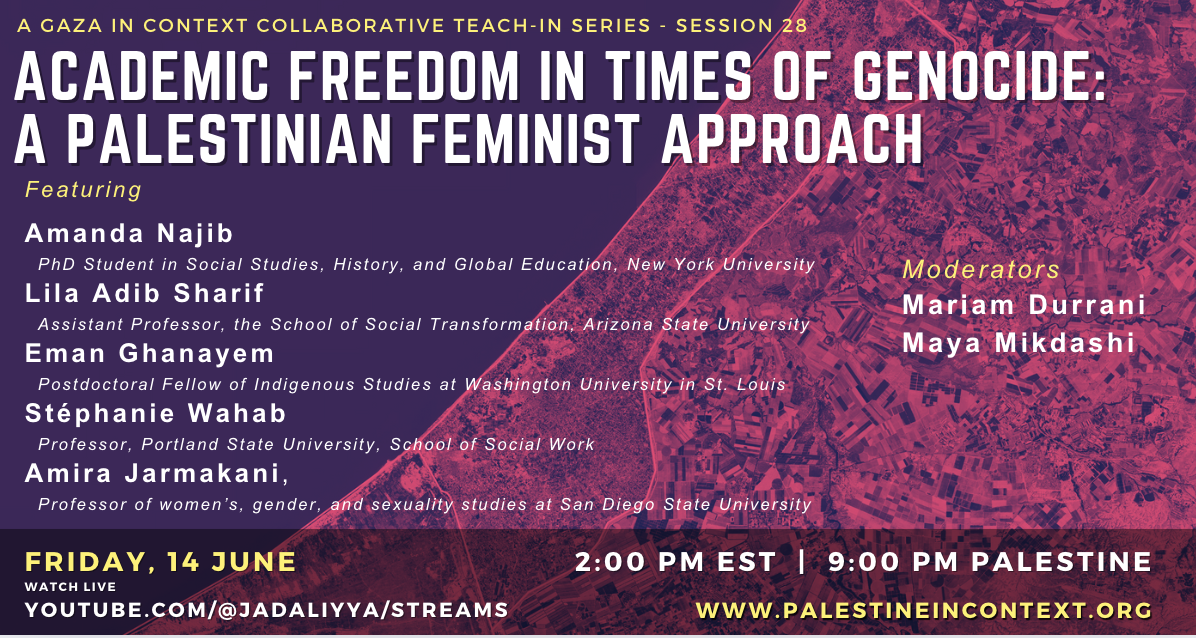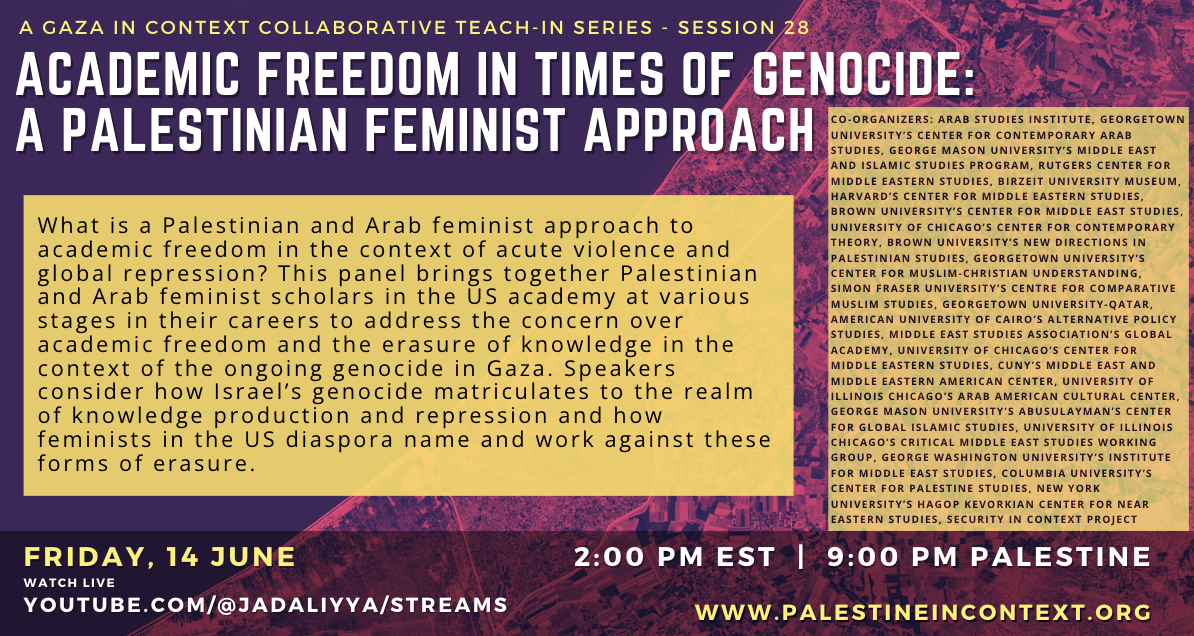Gaza in Context: A Collaborative Teach-In Series — Session 28
Academic Freedom in Times of Genocide:
A Palestinian Feminist Approach
Featuring: Amanda Najib, Lila Adib Sharif, Eman Ghanayem,
Stéphanie Wahab, Amira Jarmakani
Moderated by: Mariam Durrani, Maya Mikdashi
14 June 2024
11:00 AM PST | 2:00 PM EST | 9:00 PM Palestine
Teach-In Session 28
What is a Palestinian and Arab feminist approach to academic freedom in the context of acute violence and global repression? This panel brings together Palestinian and Arab feminist scholars in the US academy at various stages in their careers to address the concern over academic freedom and the erasure of knowledge in the context of the ongoing genocide in Gaza. Speakers consider how Israel’s genocide matriculates to the realm of knowledge production and repression and how feminists in the US diaspora name and work against these forms of erasure.
Gaza in Context Collaborative Teach-In Series
We are together experiencing a catastrophic unfolding of history as Gaza awaits a massive invasion of potentially genocidal proportions. This follows an incessant bombardment of a population increasingly bereft of the necessities of living in response to the Hamas attack in Israel on October 7. The context within which this takes place includes a well-coordinated campaign of misinformation and the unearthing of a multitude of essentialist and reductionist discursive tropes that depict Palestinians as the culprits, despite a context of structural subjugation and Apartheid, a matter of consensus in the human rights movement.
The co-organizers below are convening weekly teach-ins and conversations on a host of issues that introduce our common university communities, educators, researchers, and students to the history and present of Gaza, in context.
Co-organizers: Arab Studies Institute, Georgetown University’s Center for Contemporary Arab Studies, George Mason University’s Middle East and Islamic Studies Program, Rutgers Center for Middle Eastern Studies, Birzeit University Museum, Harvard’s Center for Middle Eastern Studies, Brown University’s Center for Middle East Studies, University of Chicago’s Center for Contemporary Theory, Brown University’s New Directions in Palestinian Studies, Georgetown University’s Center for Muslim-Christian Understanding, Simon Fraser University’s Centre for Comparative Muslim Studies, Georgetown University-Qatar, American University in Cairo’s Alternative Policy Studies, Middle East Studies’ Global Academy, University of Chicago’s Center for Middle Eastern Studies, CUNY’s Middle East and Middle Eastern American Center, George Mason University’s Center for Global Islamic Studies, University of Illinois Ghicago’s Arab American Cultural Center, George Washington University’s Institute for Middle East Studies


Amanda Najib is a radical educator, activist, author, and PhD student. Her work centers on issues of race, politics, and education in Palestinian communities in the diaspora. She is currently exploring the structural, institutional, and systemic discrimination Palestinian Americans face in an attempt to theorize a Palestinian Critical Race Theory.
Eman Ghanayem is a postdoctoral fellow of Indigenous studies at Washington University in St. Louis. Her work examines questions of displacement, settlement, and belonging in Palestine and Indigenous North America within literary practices and through a framework of interconnected settler colonialisms and comparative Indigeneities.
Dr. Lila Sharif is a creative writer, researcher, and assistant professor at the School of Social Transformation at Arizona State University. She is currently writing a book about the decolonial significance of the olive tree, which has been harvested by Palestinians for over 6,000 years. She teaches Indigenous education and global feminisms.
Stéphanie Wahab is an activist scholar and Professor at Portland State University’s School of Social Work. Her teaching, research and scholarship tend to occur at the intersections of individual and state sanctioned violence including but not limited to intimate partner violence, sex trades, systemic racism, militarization, and occupation.
Amira Jarmakani, she/they, is Professor of Women’s, Gender, and Sexuality Studies and affiliated faculty with the Center for Islamic and Arabic Studies and LGBTQ+ studies at San Diego State University. Her most recent book,An Imperialist Love Story: Desert Romances and the War on Terror (NYU Press 2015), explores the crucial role of desire in understanding how the war on terror works and how it perseveres. She also authoredImagining Arab Womanhood: The Cultural Mythology of Veils, Harems, and Belly Dancers in the U.S. (Palgrave Macmillan 2008), which won the National Women’s Studies Association Gloria E. Anzaldúa book prize. She is co-editor, with Pauline Homsi Vinson and Louise Cainkar, ofSajjilu Arab American: A Reader in SWANA Studies (Syracuse University Press, 2022) and a Series Advisor for the Critical Arab American Studies Series with Syracuse University Press. She has served as president of the Arab American Studies Association (2018-2022), board member for the Association of Middle East Women’s Studies (2017-2019) and Assistant Editor for the Encyclopedia of Women and Islamic Cultures (2011-2013). She is an organizer with the Stop LAPD Spying Coalition and a member of the Palestinian Feminist Collective.
